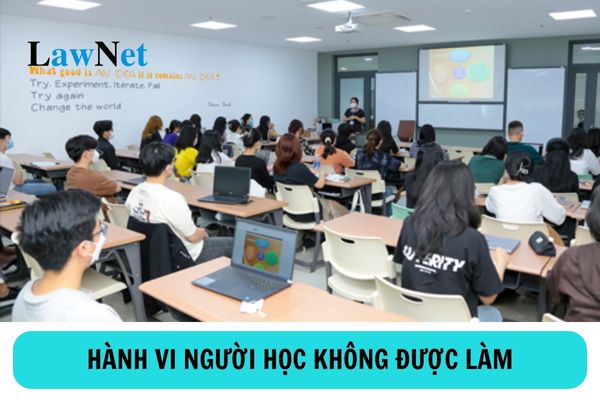What are prohibited acts for students in higher education institutions in Vietnam?
What are prohibited acts for students in higher education institutions in Vietnam?
According to Article 61 of the Higher Education Law 2012, prohibited acts for students include:
- Insulting the dignity, honor, and infringing the body of lecturers, educational management staff, employees, learners of the higher education institution, and others.
- Cheating in learning, tests, examinations, and enrolment.
- Participating in social evils, disturbing public order and security within the higher education institution or in public places, and other acts violating the law.
- Organizing or participating in illegal activities.

What are prohibited acts for students in higher education institutions in Vietnam? (Image from Internet)
What are state policies for higher education students in Vietnam?
According to Article 62 of the Higher Education Law 2012, which was partially repealed by Clause 2 of Article 2 of the Amended Higher Education Law 2018, policies for higher education students in Vietnam are stipulated as follows:
Policies for Students
- Students in higher education institutions are entitled to scholarships and social assistance policies, allocation policies, educational credits, and exemptions/reductions in public service fees as prescribed by the Education Law.
- Students in specialized fields meeting the socio-economic development, national defense, and security requirements are exempt from tuition fees and given priority in scholarship and social assistance considerations.
- The Government of Vietnam shall specify preferential policies for students eligible for priority and social policies.
Thus, the state has the following policies for students:
- Policies regarding scholarships and social assistance, allocation policies, educational credits, and exemptions/reductions in public service fees;
- Exemption from tuition and priority in scholarship and social assistance considerations for students in specialized fields meeting socio-economic development, national defense, and security requirements.
What are rights and duties of students in higher education institutions in Vietnam?
According to Article 60 of the Higher Education Law 2012, amended by Points a, b, c of Clause 31 of Article 1 of the Amended Higher Education Law 2018, students in higher education institutions have the following rights and duties:
- Studying, conducting scientific research, and practicing as stipulated.
- Respecting lecturers, management officials, public employees, and staff of the higher education institution; showing solidarity and helping each other in studying and practicing.
- Participating in labor activities and social activities, environmental protection activities, security and order protection, anti-corruption activities, academic fraud prevention, crime prevention, and eliminating social evils.
- Being respected and treated equally without gender, ethnic, religious, or origin discrimination; being provided career guidance and sufficient information about study and practice.
- Being ensured conditions for study, participating in scientific, technological, and entrepreneurial activities, practicing skills development, joining youth union activities, community service, and cultural, sports activities.
- Other rights and duties according to the regulations on the organization and operation of the higher education institution and relevant legal provisions.
What are obligations of students receiving state scholarships in higher education programs in Vietnam?
According to Article 63 of the Higher Education Law 2012, which was replaced by Clause 1 of Article 2 of the Amended Higher Education Law 2018:
Work Obligation on State Assignment for a Certain Period
- Students in higher education programs who receive scholarships and training expenses by the State or foreign funding under international treaties to which the Socialist Republic of Vietnam is a party must comply with state job assignments for at least double the time receiving scholarships and training costs after graduation. Failing to do so requires reimbursement of the scholarship and training costs.
- Within 12 months from the date of graduation recognition, the competent state authority must assign work to graduates. If no work assignment is made beyond this period, the graduate is exempt from reimbursing scholarships and training costs.
- The Government of Vietnam shall detail the reimbursement of scholarships and training costs.
Thus, students in higher education programs receiving state scholarships must comply with state job assignments after graduation. Failure to comply with above regulations requires reimbursement of the scholarships and training costs.
If more than 12 months have passed from the date of graduation recognition without work assignment, the graduate is exempt from reimbursing training costs.

